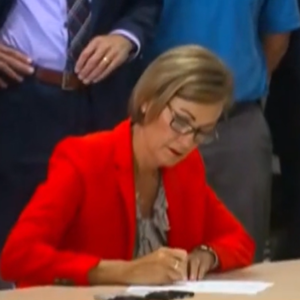Iowa governor signs bill extending biofuel tax differential

Photo: Facebook
June 30, 2020
BY Ron Kotrba
Iowa Gov. Kim Reynolds signed legislation June 30 that extends the tax differential for higher blends of biodiesel and ethanol. The governor signed the bill, Senate File 2403, during her weekly press conference at Pine Lake Corn Processors in Steamboat Rock. The measure extends a tax differential of 3 cents per gallon for biodiesel blends greater than 10 percent and ethanol blends of 15 percent or higher. The tax break would have expired June 30, 2020, but is now extended through June 30, 2026.
“Iowa continues to lead on innovative ways to drive demand for biofuels,” Reynolds said. “This legislation makes higher blend biofuels even cheaper at the pump while driving demand for homegrown renewable fuel.”
Grant Kimberley, executive director of the Iowa Biodiesel Board, said, “Extending this fuel tax differential for B11 and higher was the top biodiesel priority for our state’s biodiesel producers and soybean farmers alike, and we thank Gov. Reynolds for her unwavering commitment to biodiesel growth in our state. All of the pro-biodiesel policies in our state improve availability for consumers while contributing to the state’s economy, including the struggling farm economy.”
A study by ABF Economics shows biodiesel supports about 3,875 full time equivalent jobs and contributes $489 million to the state’s annual gross domestic product.
Advertisement
Advertisement
Reynolds also announced an additional $7 million in funding, through the federal CARES Act, for the Iowa Renewable Fuels Infrastructure Program. This state program offers cost-share dollars to fuel retailers who install or convert their equipment to allow the expanded use of renewable fuels in Iowa.
“I sincerely appreciate everyone who joined us today at Pine Lake Corn Processors, as well as U.S. Sens. Chuck Grassley and Joni Ernst, for continuing to champion policies that help our farmers and Iowa’s biofuels industry,” Reynolds said.
According to the IBB, the cost-share grant program is typically funded by the state at $3 million annually, so the $7 million boost from the federal CARES Act will provide a total expected funding of $10 million for the next fiscal year.
Advertisement
Advertisement
“This increased funding represents a potential quantum leap in Iowa’s distribution of renewable fuels, not just for our state, but for the entire region,” said Grant Kimberley, executive director of the IBB. “We commend the governor for seeking innovative funding sources to expand the Renewable Fuels Infrastructure Program, which is likely to help cement Iowa’s leadership role in a national renewable fuel movement.”
Kimberley called the IRFIP a true legislative success story that has already increased retail availability of biodiesel in Iowa almost three-fold since 2015.
“The governor’s intention to boost funding for Iowa’s biofuel infrastructure grant program is a terrific and welcome surprise,” said Nathan Hohnstein, policy director for the Iowa Renewable Fuels Association. “Iowa’s biofuels producers have been hit hard by the COVID-19 pandemic as travel has declined and fuel demand has plummeted. This additional funding will go a long way to increasing consumer access to higher biofuel blends and boosting biofuel demand.”
Since the first fuel tax differential bill was passed, E10 and higher ethanol blends and B11 and higher biodiesel blends have grown to make up roughly 90 percent and 57 percent of sales in 2019, respectively. The new fuel tax differential updates the ethanol differential by applying it only to E15 and higher blends.
Related Stories
Broco Energy on July 17 announced a new partnership with the Massachusetts Port Authority (Massport) to deliver and transition Massport's fuel tanks to renewable diesel across its various facilities.
Shell Aviation, Accenture, and Amex GBT on July 10 announced Avelia is in the process of evolving to an industry solution with independent data hosting and a multi-supplier model helping users access the GHG benefits of SAF.
The U.S EPA on July 17 released data showing more than 1.9 billion RINs were generated under the RFS during June, down 11% when compared to the same month of last year. Total RIN generation for the first half of 2025 reached 11.17 billion.
The U.S. EPA on July 17 published updated small refinery exemption (SRE) data, reporting that six new SRE petitions have been filed under the RFS during the past month. A total of 195 SRE petitions are now pending.
Avia Solutions Group, the world's largest ACMI (aircraft, crew, maintenance, and insurance) provider, has partnered with DHL Express to reduce greenhouse gas emissions from its international shipments using SAF.
Upcoming Events










